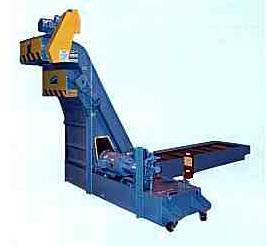Advanced chip handling/coolant system does the job for Tier II supplier
Hybrid machine tools—those machine that provide multiple machining processes such as turning centers that also do milling, or machining centers that can turn and face parts—can have dramatic impact on operations. They lower in-process inventory levels and improve quality through single machine handling and single setup.
That's the good news. There is a side to this story, however, that is fraught with "bad" news. These same machines, by offering multiple processes, also produce a more diverse selection of chips, from large to small, strings and curled springs, to fine dust-like particles, depending upon the application's material. And they can produce a lot of it in a very short time. To the point where conventional chip handling and coolant recovery systems can be overwhelmed by both the variety and the amount.

Such was the case at the Pohlman Inc. manufacturing facility located in St. Louis, Missouri. The nearly half-century old company, a Tier II automotive supplier, machines various vehicle components, with particular emphasis on the processing of air bag and SRS parts.
According to Mike Keithly, project engineer at the plant, it was one manufacturing cell comprising two Turmatic machining systems, processing aluminum SRS canister housings that presented a special chip handling challenge.
"The two machines run 24 hours a day, seven days a week, each processing more than 60,000 housings per week," says Keithly. "The machines are set up to drill, thread mill, mill, and turn a variety of features on the impact-formed housing blanks, producing everything from fines and small particles to long strings from a facing operation.
Chips produced by the barrel full
"And they produce a lot of chips—up to 210 cu ft of chips per day, per machine. The machines provide excellent performance, day in and day out, but the chip and coolant handling conveyors and wedge wire filters were unable to produce clean coolant, resulting in a loss of productivity we could not accept and still meet the demands for delivery to our customers."
Every week the machines would have to be shut down anywhere from 8 to 12 hours, roughly 5% to 8% of their projected spindle run time each seven-day period to clean chips and fines from the machines' 800-gal coolant filtering systems.
"Any longer than that, and coolant levels would back up and overflow," Keithly says.
"We also saw that chips were passing through to the clean side of the system, meaning the potential for blockages was greater, resulting in reduced coolant flow, which, in turn, is detrimental to tool life and can affect dimensional and surface finishes," Keithly points out. "Plus, these clean side contaminants, recirculating through the system can increases maintenance requirements of mechanical operating units, such as pumps, bearings, spindles, and feeds of the machines."
Finding the right chip/coolant system
Given the task of improving the uptime for these two machines, Keithly and his team of machine operators sought out enhanced chip and coolant handling systems that would both reduce the time required for cleaning and better protect the machines' components, tools, and part quality.
The solution selected was the ConSep 2000 from Mayfran International (Cleveland, OH). The ConSep 2000 is compact and most important it is a combination of chip removal conveyor/coolant filtration unit, all in one small footprint.
The ConSep 2000 is designed to replace traditional turning or machining chip conveyors, requiring little more space yet cleaning and filtering coolant at the same time. The basic unit, which can be easily modified to suit application heights and lengths, handles virtually all types of swarf including ferrous and nonferrous strings, turnings, fines, curls, and nests.
The standard system consists of a hinged and perforated steel belt conveyor for high volume chips, plus a lower drag conveyor and filter drum for removal of fines. Large chips and strings are simply carried away to the chip discharge chute by the steel conveyor as coolant flows down to the lower area containing the drag conveyor and filter drum. The coolant is maintained at a level below the height of the steel conveyor, helping to drain residual fluid from chips, plus minimizing coolant forming conditions and the problem of floating chips.
Separates fines to 50 micron
The filter unit separates fines to 50 micron nominal and features a self-cleaning, pressurized backwash for the drum's poly fiber media. The lower conveyor then picks up and carries off the fines. The over/under locating of the two discharge chutes allows chips and fines to be collected in the same hopper. The pressurized backwash system for the mesh filter means less downtime for manual cleaning.
The ConSep series of chip handling/coolant filtration units stops chip migration to clean side tanks, thus providing longer tool life and improved part tolerances and finishes. Coolant fluids last indefinitely and maintenance downtime is virtually eliminated, as sumps do not need cleaning as is the case with most standard coolant recovery systems.
"Since the installation of the ConSep 2000s, and except for one time when coolant was mistakenly contaminated with hydraulic oil, we've not had to shut down the Turmatics because of any problems with chips or coolant," Keithly reports. "In fact, over one night shift, one of the machines ran with the pressurized backwash cycle accidentally shut off. In the morning, when coolant levels and flow were noticeably down, we thought we'd have to stop production and manually clean the filter. But first the operator started up the backwash cycle—in no time at all the filter was automatically cleaned and we were back into full production."
The ConSep 2000 is available in three basic size ranges with corresponding load handling capabilities and it can also be equipped with high-pressure coolant systems. Mayfran has also introduced the ConSep 1000, a similarly designed system for cast iron and die cast aluminum processing.
Mayfran International, a subsidiary of Tomkins, P.O. Box 43038, 6650 Beta Drive, Cleveland, OH 44143-0038 USA; phone: 440-461-4100
